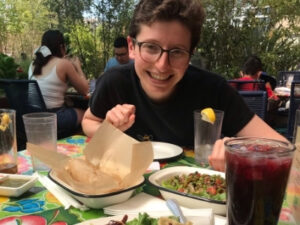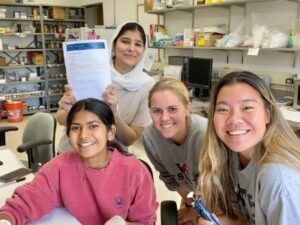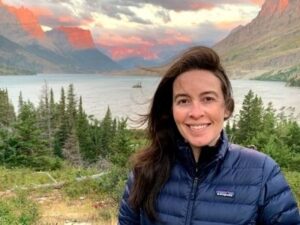 Every year, the COE awards fellowships to fund summer research opportunities for Wesleyan students across all majors and class years. Liz Woolford ’22 is a theater and government double major whose summer research project focused on developing her theater capstone project: The Party at the Edge of the World, an investigation into the intersection of performance and environmental activism. The project will culminate in a site-specific/immersive piece to be performed Friday, November 19 through Sunday, November 21, 2021, here at the COE at 284 High Street. Reservations are required for this FREE event.
Every year, the COE awards fellowships to fund summer research opportunities for Wesleyan students across all majors and class years. Liz Woolford ’22 is a theater and government double major whose summer research project focused on developing her theater capstone project: The Party at the Edge of the World, an investigation into the intersection of performance and environmental activism. The project will culminate in a site-specific/immersive piece to be performed Friday, November 19 through Sunday, November 21, 2021, here at the COE at 284 High Street. Reservations are required for this FREE event.
zooarchaeologist brunson joins coe faculty
 The COE shares faculty from across departments and programs at Wesleyan, including government, history, art, dance, computer science, English, philosophy, environmental science, biology, African American studies, physics, classical studies, chemistry, Science in Society, theater, religion, economics, archaeology, and more. Katherine Brunson is a zooarchaeologist and assistant professor of archaeology at Wesleyan who studies the origins of China’s domesticated animals and the environmental impacts of animal domestication in China. She is currently investigating the genetic relationships between domestic cattle and the extinct East Asian wild aurochs. She also codirects the online Oracle Bones in East Asia project on Open Context.
The COE shares faculty from across departments and programs at Wesleyan, including government, history, art, dance, computer science, English, philosophy, environmental science, biology, African American studies, physics, classical studies, chemistry, Science in Society, theater, religion, economics, archaeology, and more. Katherine Brunson is a zooarchaeologist and assistant professor of archaeology at Wesleyan who studies the origins of China’s domesticated animals and the environmental impacts of animal domestication in China. She is currently investigating the genetic relationships between domestic cattle and the extinct East Asian wild aurochs. She also codirects the online Oracle Bones in East Asia project on Open Context.
pipkin ’22 podcast to investigate land use in the smokies
Every year, the COE awards fellowships to fund summer research opportunities for Wesleyan students across all majors and class years.
Abi Pipkin ’22 is a government and environmental studies major interested in the question of land management in the United States. This summer she explored the Great Smoky Mountains region of Eastern Tennessee and Western North Carolina to learn more about how the privatization of land affects human stewardship of natural resources. The interviews and research she conducted will form a podcast she is developing this semester as part of her senior capstone for the environmental studies and government majors.
forklift, wes workers collab on wesworks

On October 14 & 15, 2021, Forklift Danceworks presented WesWorks, a performance celebrating the skilled movement and telling the often unheard stories of the people whose work sustains the daily lives of the Wesleyan campus.
WesWorks (2021) featured the movement and stories of Wesleyan U employees as directed by Forklift Danceworks of Austin, Texas, led by Artistic Director Allison Orr, Distinguished Fellow in the College of the Environment and Visiting Assistant Professor of Environmental Studies, with Forklift choreographer and programs manager Gretchen LaMotte ’18.
raynor seeks to illuminate illegal and small-scale fishing
Jennifer Raynor is assistant professor of economics at Wesleyan. Her research focuses on natural resource management, with an emphasis on measuring the unintended consequences of rules and regulations. In fall 2021, she is teaching ECON210/Climate Change Econ and Policy. She joined the faculty of the COE in spring 2021.
levan ’22 indulges appetite for entomophagy
 Every year, the COE awards fellowships to fund summer research opportunities for Wesleyan students across all majors and class years. Megan Levan ’22 is an environmental studies and South Asia studies in a global context (university major) major who was recently elected Wesleyan’s Gamma Chapter of Phi Beta Kappa. Megan’s research this summer centered on how edible insect-based products are being promoted by companies and received by consumers in countries not known for their entomophagic practices. Megan believes diets of the future will need to be supplemented with other available protein sources, and her research explored how insects fit into the picture.
Every year, the COE awards fellowships to fund summer research opportunities for Wesleyan students across all majors and class years. Megan Levan ’22 is an environmental studies and South Asia studies in a global context (university major) major who was recently elected Wesleyan’s Gamma Chapter of Phi Beta Kappa. Megan’s research this summer centered on how edible insect-based products are being promoted by companies and received by consumers in countries not known for their entomophagic practices. Megan believes diets of the future will need to be supplemented with other available protein sources, and her research explored how insects fit into the picture.
scobell ’22 & parikh ’22 spend summer sequencing fish genome

Every year, the COE awards fellowships to fund summer research opportunities for Wesleyan students across all majors and class years. Sophie Scobell ‘22 is a biology and East Asian studies double major. Aashni Parikh ‘22 is an earth & environmental sciences and biology double major. Scobell and Parikh, along with Fatima Ejaz, ’22 and Helen Lei ’23, spent the summer in the Chernoff Lab, setting out to sequence what will be only the fifth fully sequenced fish genome.

